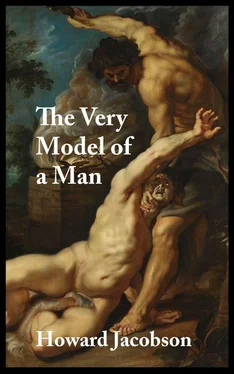It was an age before my mother became aware that they were there. When she raised her head, she found herself held by Semyaza’s insistent gaze. So it would be wherever they went, whomsoever they called on: Semyaza demanding first notice, his stare bold, unwavering, his plumage high and tense, and Azael to one side, crestfallen and peevish, fingering his ornaments.
Semyaza folded his feathers and bent low over my mother. ‘Better?’ he inquired, his voice as naked as his face. ‘Is that better for you?’ She was to understand that he was the one who had watched over her, he was the one who had blown her cool.
She nodded, screwing up her eyes as though to shield them, as though to shield herself and her credulity, from the dazzling irradiation of the angel. I recognised the expression. She had used it on me when I had impressed her with a sentence; on my father when his great boyishness had softened her heart; on Abel when he blew bubbles in the mud. Deities, the expression said, Everywhere I look I see deities; who shall protect me from Their Glory?
Where would gods be without the devotion of women? Here is why my father had been put into a deep sleep and a help meet extracted from his side. It was not Adam’s welfare the Lord of Creation had been concerned for. The one craving love and companionship, homage and adoration, was Him. H-M.
Semyaza, too, was greedy for a woman’s regard. From the steep planes of his unguarded and unshadowed face his thirsty spirit looked out, on watch for any movement or response that could be construed as admiration. At the moment of positive identification — such as now, when my mother screwed up her eyes against his splendour — his very bones shone; but should nothing be returned to him, his features offered no hiding place and bitter disappointment burned on his countenance like fever.
He was larger than any angel that had been sent to us before, half as tall again as Azael, with a wing span surely double that of his companion’s and with a more profuse feathering at his waist and heels. He was not resplendent, though — neither of them was resplendent — despite my mother’s impersonation of a mere mortal woman entirely overcome. There was something soiled about them both, as if they had journeyed too far without refreshment, or had decided to travel in borrowed plumage. This was an effect partly, as had been noticed on earlier visitations, of a fault in their engineering. Advantageous as it must have been for them, in matters relating to survival, to have arms unencumbered by feathers, in addition to wings, the drawback was an over-elaboration of musculature that impeded ordinary terrestrial movement. Sometimes the wings got in the way of the arms, sometimes the arms interfered with the functioning of the wings. They were not always certain which part of themselves to employ. They walked awkwardly. They toppled easily. The extra load told on the shoulders and the spine, creating problems of posture and any number of dermatological complications. I never once saw an angel who was not round-shouldered and stiff-necked, or whose skin was not chafed and frayed by the weight and irritation of his feathers. And this is to say nothing of lice and ring-worm and all the other consequences of careless grooming.
Even from where I was hidden, a bowshot away, I could see that Azael’s flesh was broken wherever that section of him that was bird joined that section of him that was man; and that Semyaza had only to begin to stretch a wing or scratch a scapular for a small snowstorm of snapped quills and ruined skin to fill the air around him. You invariably knew where an angel had been from the droppings of down and covert, plume and flesh, he left behind him.
Although it was not her function to notice imperfections in men or gods or angels, my mother was not able to pretend for long that she was unaware of how seriously her visitors itched and flaked. What would later become a ritual, a service expected and fought over by Semyaza and Azael, began as an act of common charity. Why don’t you let me, she said, when for the hundredth time Semyaza stood on one leg, reached behind him, and tried to rip his back apart.
‘Let you?’
Yes, she said. Adding — inconsequentially, it seemed to me — I have sons of my own.
Semyaza knelt before her, bent his neck and drew in his wings. It was a motion intended to suggest a willing submission either to execution or to pleasure — she might choose; a gesture as winning as a pet parrot’s; but from behind, as I saw him, he appeared hooded and predatory, a tattered carrion crow the colour of a dirty pigeon.
I think you need more than a scratch, my mother said when she saw how badly he was damaged. Be still. Be still, I will try not to hurt you.
‘You cannot hurt me,’ the angel told her.
She had her baby balms by her. Her Abel remedies. Her salves and balsams for sucklings and angels. Using an ointment made from crushed camomile, she bathed Semyaza’s chaps and ulcerations. Then she dusted them, as she once dusted mine, in a powder of mica and talcum.
And now you, she said to Azael.
The whole time she attended to Azael, whose shoulders were like rotten fruit, the entire rind ready to fall away in her fingers, Semyaza stood where she had to see him and be aware of his relentless attention. His eyes would not leave hers. It didn’t matter if she looked away or stared only into Azael’s sores, Semyaza was always there, claiming her thoughts.
‘I’m extremely persistent,’ he said to her. ‘That’s one of the reasons I enjoy so much trust.’
He didn’t suppose she needed to be told whose trust.
She made no reply, treating him instead to her blurred and blinded look. I had never much cared for it, even in the days before I had a brother and it was mainly I who had blinded her; but ever since she had sat down in the mud and become careless of her weight I had not thought it suited her to be bedazzled. Her jowls had grown too heavy to be tipped up in blithe innocence of all meaning; her cheeks too rounded to risk a girl’s tremor.
‘I have a stronger will than is good for me,’ Semyaza went on, still not releasing her from his gaze. ‘It’s important to me to win. I warn you of this so that you will not be surprised by what you see when you know me better. I hope my perseverance hasn’t distressed you. If it has, I am sorry. But perseverance is of my essence.’
It was the first of many boasts and the first of many apologies. What he wished to force on her was not only his presence but also the idea that he was somehow or other ambiguous. The tarnish I had seen upon his grandeur had not got there by accident, nor was it a blemish he was in any way anxious to conceal. If a fragrance less than celestial blew from his plumes, he wanted my mother to smell it; if the drama of his moral life revolved around the issue of whether it was his destiny to inspire trust or betray it, he wanted her to sit in on the struggle. Some men seek to hide the thing in their nature that perverts their goodness; others, and these may include angels, are happy only when their soul’s corruption is made public.
‘Hail, Mother of Mankind,’ Semyaza had said unto Eve after the opening pleasantries — an angel of the Lord remembering himself. ‘Hail, Eve, whose fruitful womb…’ (I closed my ears to this.) ‘Hail, first and best of women. Blessings we bring thee from the Most High.’ He had used his full height, showing, in his divine lineaments, how recently he had brushed majesty. Truly, the sun had reddened in his countenance, the seven thunders had rolled in his chest, and his feet had been as pillars of fire. Yet I could have sworn he had put an alternative gloss on his mission — appended a derisive footnote — daring my mother to detect it and thereby be the cause of his defection. What I am doing for Him, I would rather be doing for myself, he seemed to be saying, and he was saying it on the strength of the briefest acquaintance, a handful of sentences, a minute or two of beating his wings on a hot afternoon.
Читать дальше











